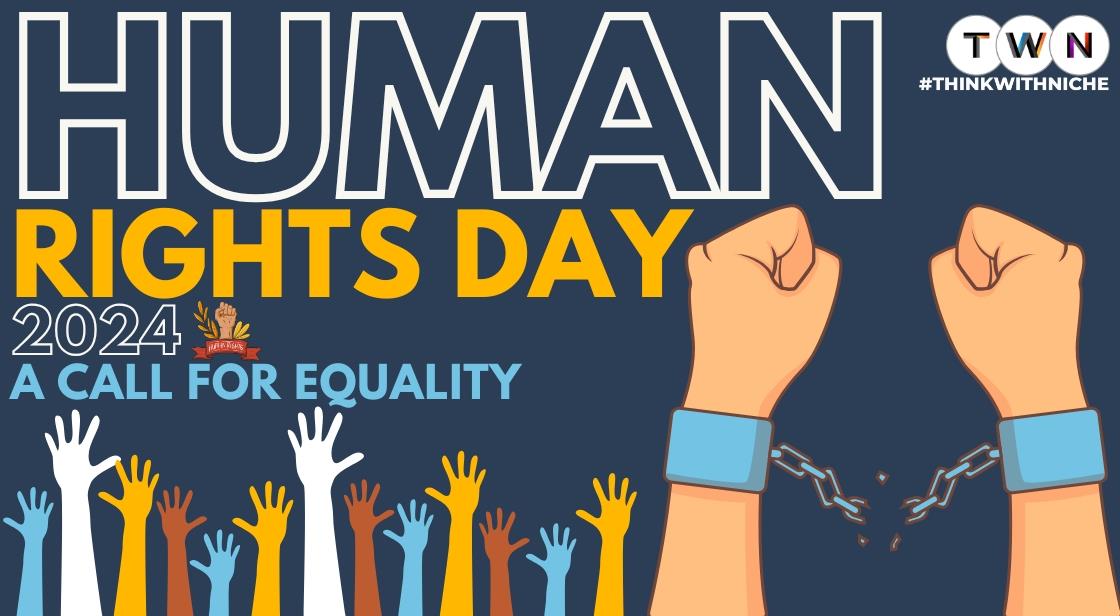Human Rights Day 2024 – A Call for Equality

Blog Post
Human Rights Day, observed annually on December 10th, is a powerful reminder of the fundamental rights and freedoms that every individual is entitled to, regardless of their nationality, ethnicity, or background.
This day marks the anniversary of the adoption of the Universal Declaration of Human Rights (UDHR) by the United Nations General Assembly in 1948, a landmark document that laid the foundation for global human rights standards.
Human Rights Day serves not only as a commemoration of the progress made in the fight for equality, dignity, and justice but also as a call to action for addressing ongoing human rights violations around the world.
In 2024, with the theme "Our Rights, Our Future, Right Now," the focus is on mobilizing immediate efforts to protect human rights and ensure a better, more equitable future for all. This day highlights the importance of recognizing and upholding human rights as we work toward a more inclusive and just world.
The Importance of Human Rights Day 2024
Human Rights Day Overview
Human Rights Day is observed annually on December 10th, marking the anniversary of the adoption of the Universal Declaration of Human Rights (UDHR) by the United Nations General Assembly in 1948. This day is dedicated to raising awareness about human rights and promoting the global protection of individual freedoms and dignity.
Significance of Human Rights Day
Human Rights Day serves as a reminder of the importance of respecting and upholding human rights across the globe. It aims to highlight the struggles and achievements related to human rights and encourage global efforts to address violations. The day draws attention to key issues like freedom of speech, the right to education, and the fight against discrimination.
Role of the United Nations
The United Nations plays a crucial role in promoting and protecting human rights worldwide. Through various treaties, conventions, and agencies like the UN Human Rights Council, the UN supports efforts to safeguard human rights, monitor abuses, and encourage member states to honor their obligations under international law. Human Rights Day provides a platform for the UN to lead and advocate for these rights globally.
1. History and Evolution of Human Rights Day
Establishment of Human Rights Day
Human Rights Day is observed every year on December 10th to honor the adoption of the Universal Declaration of Human Rights (UDHR) by the United Nations General Assembly in 1948. The UDHR, a groundbreaking document, was crafted as a response to the atrocities of World War II and aimed to provide a common standard for human dignity, freedom, and equality worldwide. The declaration was the first global recognition of the rights to which all people are inherently entitled, regardless of nationality, ethnicity, or religion.
Milestones in the Evolution of Human Rights Day
Since its establishment, Human Rights Day has grown in significance, becoming a symbol of the global struggle for human rights. In 1950, the UN General Assembly formally called for the observance of Human Rights Day on December 10th each year to commemorate the UDHR’s adoption. Over the years, this day has served as an important occasion to reflect on progress made in human rights while raising awareness about the ongoing challenges.
Evolution to Address Contemporary Issues
As the world’s understanding of human rights has evolved, so too has Human Rights Day. Initially focused on the recognition of basic civil and political rights, the observance has expanded to include social, economic, and cultural rights. Today, Human Rights Day addresses pressing global issues such as gender equality, racial justice, climate change, refugee rights, and the fight against discrimination.
Each year, the United Nations designates a specific theme for the day, encouraging worldwide reflection and action on critical human rights concerns.
Also Read: Honoring Animal Rights on World Animal Welfare Day 2024
2. The Theme of Human Rights Day 2024
The theme for Human Rights Day 2024 is "Our Rights, Our Future, Right Now." This theme emphasizes the importance of immediate action to protect and promote human rights, highlighting how these rights are essential for building a better future.
Focus on Equality
Equality remains a fundamental human right because it ensures that everyone has the same opportunities and protections, regardless of their background. Ongoing struggles for racial, gender, and economic equality highlight the need for continued efforts to address systemic injustices. For example, movements like Black Lives Matter and #MeToo have brought attention to racial and gender discrimination, respectively, while economic inequality remains a significant challenge in many parts of the world.
Reflecting Current Global Challenges
The theme reflects current global challenges such as inequality, discrimination, and social justice movements. These issues are pervasive and require collective action to address. The theme encourages individuals and communities to recognize their role in promoting human rights and to take concrete steps to combat these challenges.
Importance of Human Rights
Human rights are not just abstract concepts; they provide a framework for protecting individuals from abuses and ensuring their dignity and freedom. By upholding human rights, we can prevent harm, protect vulnerable populations, and transform societies to be more just and equitable.
Mobilizing Action
The theme calls for mobilizing action to reinvigorate the global human rights movement. It urges people to use their voices and votes to advocate for human rights and to build strong social movements that stand up for the rights of all individuals.
Human Rights Day 2024 aims to inspire everyone to acknowledge the importance of human rights and to take action to ensure that these rights are respected and protected for everyone, everywhere.
3. Importance of Equality in Human Rights
Concept of Equality in Human Rights
Equality in human rights refers to the principle that all individuals should enjoy the same fundamental rights and freedoms, regardless of their background. It encompasses various dimensions, including:
-
Political Equality: Ensures equal participation in political processes, such as voting rights, freedom of expression, and the ability to influence decision-making.
-
Economic Equality: Focuses on equal access to resources, employment, fair wages, and opportunities to improve one’s economic status.
-
Social Equality: Ensures that people have equal access to education, healthcare, housing, and social services, without discrimination.
-
Cultural Equality: Protects the right of individuals and groups to freely express their cultural identities, practices, and beliefs, ensuring no one is marginalized due to cultural differences.
How Inequality Violates Human Rights
Inequality disrupts the core principles of human rights by creating divisions based on race, gender, disability, or economic status. When certain groups are denied equal access to resources or opportunities, their rights to freedom, dignity, and security are violated. For instance:
-
Gender Inequality: Women and girls often face discrimination in education, employment, and decision-making roles, violating their rights to equality and liberty.
-
Racial Discrimination: Minority groups are frequently excluded from political participation, economic opportunities, and social justice, which undermines their basic human rights.
Need for Equal Opportunities
To uphold human rights, it is essential to implement policies and actions that promote equality. Governments and institutions must create frameworks that ensure fairness, address systemic barriers, and ensure equal access for all individuals, irrespective of their race, gender, disability, or economic status.
4. Global Challenges to Equality
-
Highlight ongoing human rights violations related to inequality, such as gender inequality, racial discrimination, and economic disparities.
-
Discuss challenges faced by marginalized groups, including refugees, minorities, and people living in poverty.
-
Provide examples from various regions or countries where human rights are under threat due to inequality.
5. Human Rights Day 2024 Campaigns and Initiatives
Global and Local Initiatives
-
UN Human Rights Office: The UN Human Rights Office is leading a campaign titled "Our Rights, Our Future, Right Now." This campaign focuses on showcasing the tangible impact of human rights by addressing relevant global issues and presenting practical solutions.
-
National Human Rights Commission (NHRC), India: The NHRC is organizing a program at Vigyan Bhavan in New Delhi, with the President of India as the Chief Guest. The event will be followed by a National Conference on "Mental well-being: Navigating stress from classroom to workplace."
Role of NGOs, Governments, and International Organizations
-
NGOs: Non-governmental organizations (NGOs) play a crucial role in promoting human rights, especially when government efforts fall short. They amplify the voices of marginalized communities and provide essential aid to victims.
-
Governments: Governments are responsible for upholding and protecting human rights. The NHRC in India, for example, works to ensure the protection of both civil and political rights, as well as economic, social, and cultural rights.
-
International Organizations: The UN Human Rights Office and other international organizations work to promote and protect human rights globally. They provide a platform for collaboration and advocacy, aiming to create a more equitable world.
Specific Actions and Events
-
Public Rallies and Marches: Various public events, including rallies and marches, will be organized to promote human rights and raise awareness.
-
Cultural Events: Film screenings, concerts, and art exhibitions will be hosted to engage the public and highlight human rights issues.
-
Workshops and Interactive Sessions: Educational campaigns and workshops will be conducted to educate people about human rights and the Universal Declaration of Human Rights (UDHR).
-
Panel Discussions: Engaging discussions with activists and leaders will take place to address pressing human rights issues and advocate for change.
Human Rights Day 2024 aims to inspire everyone to acknowledge the importance of human rights, change perceptions, and mobilize action to reinvigorate the global human rights movement. It's a call to action for individuals and communities to stand up for their rights and those of future generations.
Human Rights Declared by the Universal Declaration of Human Rights (UDHR)
The Universal Declaration of Human Rights (UDHR), adopted by the United Nations General Assembly in 1948, consists of 30 articles outlining the fundamental human rights that should be protected for all people, regardless of race, nationality, or religion. These rights provide a global framework to ensure dignity, equality, and freedom. Below is a summary of these rights:
1. Right to Freedom and Equality (Article 1)
Every individual is born free and equal in dignity and rights.
2. Freedom from Discrimination (Article 2)
No one should face discrimination based on race, gender, language, religion, or any other status.
3. Right to Life, Liberty, and Security (Article 3)
Everyone has the right to life, freedom, and personal security.
4. Freedom from Slavery (Article 4)
No one shall be subjected to slavery or servitude.
5. Freedom from Torture or Cruel Treatment (Article 5)
No one shall be subjected to torture, inhuman, or degrading treatment.
6. Right to Recognition before the Law (Article 6)
Everyone has the right to be recognized as a person before the law.
7. Equal Protection under the Law (Article 7)
All individuals are equal before the law and are entitled to protection against discrimination.
8. Right to an Effective Legal Remedy (Article 8)
Everyone has the right to an effective remedy by the competent national tribunals for acts violating their rights.
9. Freedom from Arbitrary Arrest or Detention (Article 9)
No one shall be subjected to arbitrary arrest or detention.
10. Right to a Fair and Public Trial (Article 10)
Everyone is entitled to a fair and public hearing by an independent and impartial tribunal.
11. Presumption of Innocence (Article 11)
Everyone is presumed innocent until proven guilty.
12. Right to Privacy and Protection from Attacks (Article 12)
Everyone has the right to privacy, family, home, and correspondence protection from arbitrary interference.
13. Freedom of Movement and Residence (Article 13)
Everyone has the right to move freely within a country and to leave and return to their country.
14. Right to Seek Asylum (Article 14)
Everyone has the right to seek asylum from persecution in other countries.
15. Right to a Nationality (Article 15)
Everyone has the right to a nationality and to change it.
16. Right to Marriage and Family (Article 16)
Everyone has the right to marry and found a family, and this should be done with free and full consent.
17. Right to Own Property (Article 17)
Everyone has the right to own property, either alone or in association with others.
18. Freedom of Thought, Conscience, and Religion (Article 18)
Everyone has the right to freedom of thought, conscience, and religion.
19. Freedom of Opinion and Expression (Article 19)
Everyone has the right to hold opinions and to express them freely.
20. Freedom of Peaceful Assembly and Association (Article 20)
Everyone has the right to peacefully assemble and associate with others.
21. Right to Participate in Government (Article 21)
Everyone has the right to participate in government, directly or through freely chosen representatives.
22. Right to Social Security (Article 22)
Everyone has the right to social security and access to economic, social, and cultural rights necessary for dignity.
23. Right to Work and Fair Employment (Article 23)
Everyone has the right to work, to free choice of employment, and to just and favorable conditions of work.
24. Right to Rest and Leisure (Article 24)
Everyone has the right to rest and leisure, including reasonable working hours and periodic holidays with pay.
25. Right to an Adequate Standard of Living (Article 25)
Everyone has the right to an adequate standard of living, including food, clothing, housing, and medical care.
26. Right to Education (Article 26)
Everyone has the right to education, which should be free, at least in elementary stages.
27. Right to Cultural Participation and Protection of Intellectual Property (Article 27)
Everyone has the right to freely participate in cultural life and to protect their intellectual property.
28. Right to a Social and International Order for Rights Realization (Article 28)
Everyone has the right to a social and international order in which these rights and freedoms can be fully realized.
29. Duties to the Community (Article 29)
Everyone has duties to the community, ensuring respect for others' rights and freedoms.
30. Protection Against Acts That Destroy Rights (Article 30)
No one shall engage in acts that destroy the rights and freedoms outlined in this declaration.
These rights serve as a global standard, aiming to ensure that all people are treated with dignity and respect, irrespective of their background or status.
Conclusion
Human Rights Day 2024 serves as a critical reminder of the ongoing struggle for equality, dignity, and freedom worldwide. As we reflect on the importance of human rights, it is essential to recognize both the progress made and the challenges that still lie ahead.
The theme for this year, "Our Rights, Our Future, Right Now," underscores the urgency of collective action in safeguarding these fundamental rights for all individuals, irrespective of race, gender, or background.
On this day, we celebrate the achievements in human rights while acknowledging the work still required to address violations and inequalities across the globe. By staying committed to the principles enshrined in the Universal Declaration of Human Rights, we can inspire positive change, ensuring that every person can enjoy a life of freedom, equality, and dignity.
Let Human Rights Day 2024 be a call to action for individuals, communities, and nations to come together and create a world where human rights are respected, protected, and fulfilled for everyone, everywhere.
You May Like
EDITOR’S CHOICE












